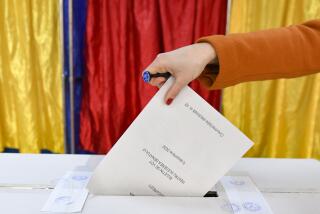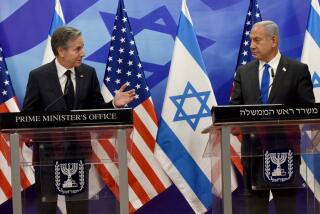Palestinian Poll Results ‘Alarming’
- Share via
JERUSALEM — A new survey of Palestinian public opinion due to be released today shows a further hardening of attitudes and a rise in support for an Islamic political system over a democratic one.
The poll by Birzeit University, the Palestinians’ oldest institution of higher learning, suggests that a majority would vote for Palestinian Authority President Yasser Arafat if he ran for reelection. But the most important criteria for a president, Palestinians said in the poll, are the ability to “confront Israel” and remain committed to “Islamic values.”
Nader Said, the Birzeit sociologist who conducted the survey, said the results are troubling for anyone who wants to build a democratic, pluralistic Palestinian state. He said the last 23 months of violence and extremism have erased any gains made before the outbreak of the current intifada, or uprising, and have radicalized the society. Deepening poverty and the failings of the Palestinian Authority have helped push people toward Islamic militancy, he said.
“There has been a major shift in Palestinian political culture that has negative social implications,” Said said. “It’s extremely alarming from my perspective.”
Among the causes for concern, he said, is the large majority of 18-to 22-year-olds who said they would not vote for a woman for president. Overall, 54% of the respondents said they would be willing to vote for a woman.
In choosing a political system, 42% favored a democratic, pluralistic one, and 42% wanted one-party Islamic rule. Birzeit’s Development Studies Program conducts such surveys regularly but had not previously posed this question. From other polling done in the late 1990s, however, Said estimated that support for democracy has dropped about 20 percentage points.
It is not clear whether such views are permanent. Though support for radical Islamic organizations such as Hamas and the Islamic Jihad has increased, some of the extremism may be exaggerated as a way of defying what Palestinians perceive to be U.S.-and Israeli-imposed ideas, Said said.
To conduct the poll, researchers hiked over back roads and through ditches to reach many of the targeted 75 towns and villages, most of them cut off by Israeli army restrictions.
The survey reflects widespread skepticism about presidential, legislative and local elections called by Arafat, and about announced measures aimed at reforming the Palestinian Authority’s security services and financial system. Neither elections nor reform were seen as likely to improve Palestinians’ lives.
In a piece of bad news for U.S. policymakers, similar skepticism was expressed about the U.S. role in the region. Ninety-one percent said Washington is demanding reform of Palestinian institutions merely for its own political interests, with only a fraction believing that the reforms are designed to benefit the Palestinian people.
Support for resuming political negotiations with the Israelis also has declined.
“Two long years of extreme hopelessness and violence is going to have an impact, especially on young people who see that this intifada is not empowering them,” Said said.
On Sunday, scattered violence continued. The Israeli army said troops killed a Palestinian gunman who was attacking a Jewish settlement in the Gaza Strip. An Israeli was wounded by gunfire in that encounter. In the northern West Bank city of Jenin, two Israeli soldiers were wounded in a gun battle with Palestinians, the army said.
Israeli journalist Gideon Levy said the army opened fire on him and his photographer earlier Sunday as they were riding in a marked Israeli taxi into the West Bank city of Tulkarm. They had obtained explicit army approval to enter the town and had checked in with the soldiers on duty as they approached, Levy said.
But as they drove slowly toward a second army position, the soldiers opened fire and continued to shoot, he said.
Fortunately, Levy said, the car was bulletproof and no one was hurt. Also in the taxi was an investigator from Israeli Physicians for Human Rights.
Levy, who writes for the liberal newspaper Haaretz, specializes in articles about the suffering of Palestinians and was traveling to Tulkarm to look into the killing last week of a Palestinian teenager.
The army said Sunday evening that the shooting was a mistake and apologized. Defense Minister Binyamin Ben-Eliezer called Levy to express his regret, Israeli radio reported.
More to Read
Sign up for Essential California
The most important California stories and recommendations in your inbox every morning.
You may occasionally receive promotional content from the Los Angeles Times.











